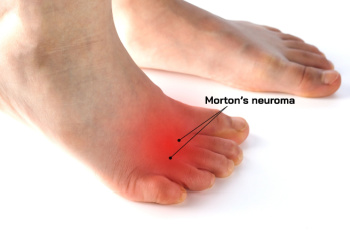 Morton's neuroma is a painful condition that affects the ball of your foot, usually between the third and fourth toes. This common issue is caused by the thickening of the tissue around one of the nerves leading to your toes. Thickening often occurs from excessive pressure or irritation from wearing tight or high-heeled shoes. Activities that involve repetitive foot stress, like running or certain sports, can also advance the development of Morton's neuroma. Morton's neuroma can significantly impact your ability to walk comfortably. As the tissue around the nerve thickens, it causes sharp, burning pain in the ball of your foot, which can make each step excruciating. The pain often spreads into your toes, causing numbness or a tingling feeling. Over time, walking or even standing for a long time can become hard, making it tough to complete daily activities and move around normally. The discomfort can also cause you to alter your walking pattern to avoid putting pressure on the painful area. This might lead to additional problems in areas such as the knee, hip, or back due to the uneven balance of weight. If you are struggling with Morton’s neuroma, it is highly suggested you consult with a podiatrist for an exam and diagnosis, followed by treatment options.
Morton's neuroma is a painful condition that affects the ball of your foot, usually between the third and fourth toes. This common issue is caused by the thickening of the tissue around one of the nerves leading to your toes. Thickening often occurs from excessive pressure or irritation from wearing tight or high-heeled shoes. Activities that involve repetitive foot stress, like running or certain sports, can also advance the development of Morton's neuroma. Morton's neuroma can significantly impact your ability to walk comfortably. As the tissue around the nerve thickens, it causes sharp, burning pain in the ball of your foot, which can make each step excruciating. The pain often spreads into your toes, causing numbness or a tingling feeling. Over time, walking or even standing for a long time can become hard, making it tough to complete daily activities and move around normally. The discomfort can also cause you to alter your walking pattern to avoid putting pressure on the painful area. This might lead to additional problems in areas such as the knee, hip, or back due to the uneven balance of weight. If you are struggling with Morton’s neuroma, it is highly suggested you consult with a podiatrist for an exam and diagnosis, followed by treatment options.
Morton’s neuroma is a very uncomfortable condition to live with. If you think you have Morton’s neuroma, contact Barry P. Weinstein, DPM of Bellaire Podiatry. Our doctor will attend to all of your foot care needs and answer any of your related questions.
Morton’s Neuroma
Morton's neuroma is a painful foot condition that commonly affects the areas between the second and third or third and fourth toe, although other areas of the foot are also susceptible. Morton’s neuroma is caused by an inflamed nerve in the foot that is being squeezed and aggravated by surrounding bones.
What Increases the Chances of Having Morton’s Neuroma?
Morton’s neuroma is a very treatable condition. Orthotics and shoe inserts can often be used to alleviate the pain on the forefront of the feet. In more severe cases, corticosteroids can also be prescribed. In order to figure out the best treatment for your neuroma, it’s recommended to seek the care of a podiatrist who can diagnose your condition and provide different treatment options.
If you have any questions, please feel free to contact one of our offices located in Bellaire and Houston, TX . We offer the newest diagnostic and treatment technologies for all your foot care needs.